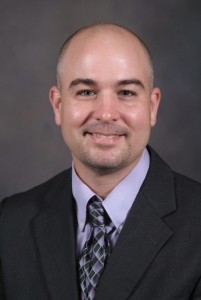UA Division of Agriculture, UA-Monticello Announce Blazier as College of Forestry Dean, Arkansas Forest Resources Center Director
May 5th, 2021 by The University of Arkansas Division of Agriculture and the University of Arkansas at Monticello have announced Michael Blazier as the next Dean for the UAM College of Forestry, Agriculture and Natural Resources and Director of the Arkansas Forest Resources Center. He will assume his duties July 1.
The University of Arkansas Division of Agriculture and the University of Arkansas at Monticello have announced Michael Blazier as the next Dean for the UAM College of Forestry, Agriculture and Natural Resources and Director of the Arkansas Forest Resources Center. He will assume his duties July 1.
The Tuesday announcement was made by UAM Chancellor Dr. Peggy Doss and UA System Vice President for Agriculture Dr. Mark Cochran on a Zoom call to College faculty. Both Cochran and Doss thanked the search committee for providing top-tier candidates. Each also extended their thanks and appreciation to Dr. Robert Ficklin, Sturgis endowed professor of forest biology, for his leadership as interim dean.
Chancellor Doss says the position is distinctive in the breadth of its oversight and in its opportunities to unite resources, people, and objectives. She said, “There are a number of vital priorities right now for our University, Division, the System, and beyond – Dr. Blazier is exactly the visionary to serve as an enthusiastic, collaborative partner between and among institutions.” She emphasized the importance of his role to the state and its economic future. “With his expertise, I see Dr. Blazier as an innovative leader to ensure strong academic programs, crucial research, and extension services for Arkansas and the region.
Blazier comes from Louisiana State University, where he has served for 18 years as a forestry project leader at the LSU AgCenter Hill Farm Research Station and professor. He is experienced as a statewide forestry extension specialist and holds dozens of peer-reviewed publications. He holds a bachelor’s degree in forestry from Louisiana Tech University, as well as a master’s and Ph.D. in forestry fields from Oklahoma State University. He will serve as only the second dean of the College of Forestry, Agriculture and Natural Resources. Dr. Philip Tappe retired in December after nearly 30 years with UAM.
Blazier grew up in West Monroe, Louisiana, less than 90 miles from the Monticello campus. He said, “Since early in my career, I’ve collaborated regularly with UAM faculty, and I’ve always been impressed with their teamwork, perseverance in getting research funding and implementing the projects, and the resources they had available to conduct the research. I also have family ties to the area, so I look at this position as a chance to work with a great group of faculty and staff with the added benefit of doing so on my ‘home turf.’ Add to that the natural and agricultural resources Arkansas offers – and the opportunities to help the College and Center achieve high impacts in their mission seem endless.” The UAM forestry program is approaching its next reaccreditation by the Society for American Foresters (SAF), a process Blazier will closely oversee. UAM offers the only SAF-accredited forestry studies in Arkansas.
With an extensive background in forest research and extension projects, Blazier expects similar opportunities to oversee innovative research activities. He said, “I’ve focused on forest plantation management and agri-forestry where we co-mingled tree growth and cattle production. We have done that with row crops and trees. We have looked at different lines of ecological restoration on bottomland hardwoods, longleaf pine, and shortleaf pine.” He says he seeks to support research that is timely and relevant to the immediate area, bringing research results directly to forest practitioners, natural resource professionals, and landowners who can put recommended practices into action. Blazier was responsible for managing 500 acres of Louisiana timber at the Hill Farm Research Station, where there is also a 300-head cattle herd.
In addition to leading an academic unit at UAM, Blazier will serve as the Director of the Arkansas Forest Resources Center. The Center serves as the research arm for the UA System Division of Agriculture with respect to forestry. Projects such as forest health, climate, watershed protection, and wildlife habitat have featured as recent focus areas. The Center facilitates much of the grant writing for forestry research in the state. It is primarily located on the University of Arkansas at Monticello campus, but center faculty members extend to Little Rock, Fayetteville, Hope, Pine Tree, and Batesville.
“Dr. Blazier is bringing a wealth of experience in research, extension and teaching, which will be an asset to the college and the Arkansas Forest Resources Center,” said Mark Cochran, vice president-agriculture, for the University of Arkansas System. “He has already worked with the faculty and our stakeholders in the state. He is also very familiar with the management issues of our southern forests. We are very excited about the leadership that he will provide to the programs in forestry, wildlife and agriculture.”
Blazier arrives at the Monticello campus as UAM and the Division of Agriculture embark on a waterfowl laboratory partnership with Five Oaks Ag Research and Education Center. The partnership provides an opportunity for conservation and wildlife habitat professionals and private landowners to observe and understand the evolving strategies for preserving and improving the wetland ecosystem within the Mississippi Alluvial Valley. Students will engage with research in a geographically unique environment and earn a credential made possible through the collaboration. Beginning this fall, the first students will enroll in coursework toward a graduate certificate in waterfowl habitat and recreation management, a program that emerged in part through industry demand for the specialized training.
Blazier says he and his family look forward to settling in the familiar southeast Arkansas area and connecting with the welcoming community. His wife Stacy is an accomplished pathologist in the poultry industry, and their twin 17-year-old boys will begin their senior year of high school this fall.
About the UAM College of Forestry, Agriculture and Natural Resources and the Arkansas Forest Resources Center
The College of Forestry, Agriculture and Natural Resources, and the Arkansas Forest Resources Center, a University of Arkansas System Center of Excellence, bring together interdisciplinary expertise through a partnership between the University of Arkansas at Monticello and the University of Arkansas System Division of Agriculture.
The College and Center are headquartered at the University of Arkansas at Monticello campus, but their programs reach statewide with the mission of developing and delivering teaching, research, and extension programs that enhance and ensure the sustainability and productivity of forest-based natural resources and agricultural systems. Academic programs are delivered by the College of Forestry, Agriculture, and Natural Resources through the University of Arkansas at Monticello. Through the Division of Agriculture, research is administered by the Arkansas Agricultural Experiment Station, and extension and outreach activities are coordinated by the Arkansas Cooperative Extension Service.
The College of Forestry, Agriculture, and Natural Resources offers associate, baccalaureate, and graduate programs in Natural Resources Management, Agriculture, and Land Surveying. These include Forestry, Agriculture Business, Wildlife Management & Conservation, Animal Science, Pre-Veterinary Science, Geospatial Science, Agriculture Site-Specific Management, Plant and Soil Science, General Agriculture, Communications in Natural Resources, and Environmental Science. The college offers 2-year Associate degrees in Forest Technology, Agriculture, and Land Surveying Technology. The Master of Science in Forest Resources offers emphasis areas in Forest Science, Geospatial Science, Natural Resource Management, and Wildlife Ecology and Management. The college is designated as a Non-Land Grant College of Agriculture and offers the only baccalaureate degree forestry program in the state which the Society of American Foresters accredits. Generous supporters of the college have provided for more than 50 fully endowed student scholarships.
About the Division of Agriculture
The University of Arkansas System Division of Agriculture’s mission is to strengthen agriculture, communities, and families by connecting trusted research to the adoption of best practices. Through the Agricultural Experiment Station and the Cooperative Extension Service, the Division of Agriculture conducts research and extension work within the nation’s historic land grant education system.
The Division of Agriculture is one of 20 entities within the University of Arkansas System. It has offices in all 75 counties in Arkansas and faculty on five system campuses.
The University of Arkansas System Division of Agriculture offers all its Extension and Research programs and services without regard to race, color, sex, gender identity, sexual orientation, national origin, religion, age, disability, marital or veteran status, genetic information, or any other legally protected status, and is an Affirmative Action/Equal Opportunity Employer.
Choose another article
Newer article: U of A Offers Free Best Care Training for Child Care Providers, May 15th At UAM
Older article: Wanted: House For Rent
























































